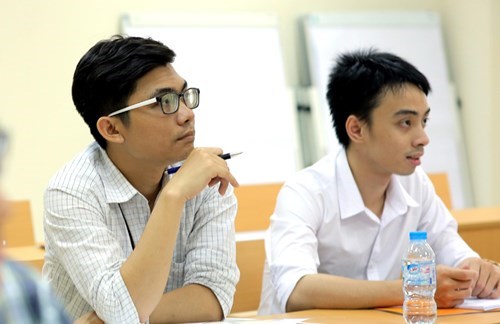    |
 |
|
Viettel's newly-recruited officials and workers have been provided with basic knowledge of the group's history, working culture, regulations and business activities |
The program is considered the group’s warm welcome to its new employees and is a doorway to their future careers with the group. Besides basic knowledge, the program teaches new officials and workers how to accept and harmonize themselves with the community of Viettel’s officials and workers, as well as gave them tips to work effectively and develop their careers in the company. By so doing, Viettel wants all officials and workers to see the company as not only a working place, but also their second home, where they can happily work and live as well as develop and realize their dreams.
Each training course lasts around 5 days. But the training courses are specialized to meet the needs of different groups of staff members working in different specialties. Almost all officials and workers working for the company from one month to six months have an opportunity to participate in such a training course. In other words, telecommunication technology – the main sector and profit center of the group, will no longer be trained for all new staff members. Instead, the new program has been concretized to meet the needs of various specific groups of newly-recruited officials and workers for their work. For instance, those who work in research and development will be trained in the group’s overview and general issues on research and development; and those who work in telecommunications will focus on studying the group’s overview on telecommunication business and some telecommunication techniques.
In the first training course from 13 September, 2017 to 16, the new approach was applied to train 31 newly-recruited engineers and experts working at the Viettel Institute for Research and Development and the Viettel Aerospace Institute. After the training courses, the trainees’ feedbacks were very positive as they were all provided information and knowledge very useful to their jobs.
Even the contents of the courses on working culture and code of conduct were also readjusted, focusing on themes that trainees are really interested in. These courses also highlighted the real issues in the group, including the lack of interactions in working groups and projects, ineffective coordination and mutual support at work, and slow integration of the newcomers in the group due to their shortages of the group’s working culture.
All trainees of the course were researchers, technical experts and engineers who had wanted to work on their own with little communication with each other during the working hours. But after some days of training, they changed themselves and became open-minded and sociable. They quickly applied the newly-acquired knowledge and skills to communicate with each other in discussions, group-works and other activities.
During the courses, the “learner-centered” approach was strictly applied. Accordingly, the courses focused only on the information, knowledge and skills that the trainees really needed. Furthermore, the trainees self-studied, discussed topics, presented the solutions, and played games to draw useful lessons and experiences for themselves.
Most of the trainees wanted the 4-day courses to last some more days so that they can learn more about working skills and the business culture of Viettel.
“When I knew that I was enrolled in the course, I did not want to leave my work and attend the course. But now I wish the course had lasted longer so I could have learnt more and mingled with my classmates,” said Dang Anh Quang, a researcher at the Viettel Research and Development Institute.
Translated by Thu Nguyen